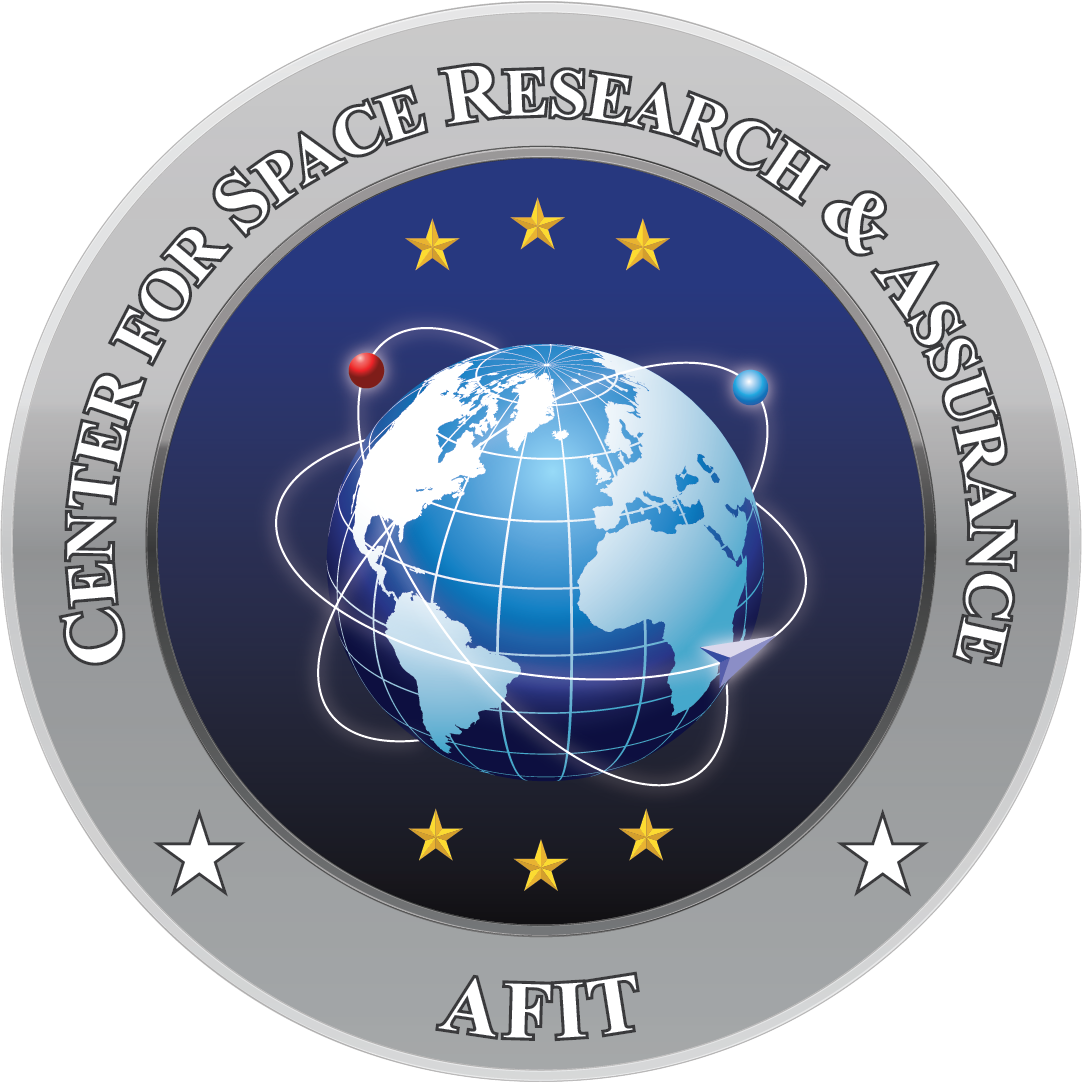CSRA Theses and Dissertations
This collection is entirely Distribution A, Approved for Public Release.
Theses/Dissertations from 2019
Characterization and Anomalous Diffusion Analysis of a 100w Low Power Annular Hall Effect Thruster, Megan N. Maikell
Uranium Dioxide Actinide Detection Device Support Design for Space Applications, Jennifer N. Ramos
Variations of Heavy Ion Abundances Relative to Proton Abundances in Large Solar Energetic Particle Events, Joseph F. Round
Computational Aerothermodynamic Analysis of Satellite Trans-Atmospheric Skip Entry Survivability, John J. Runco
Unresolved Object Detection Using Synthetic Data Generation and Artificial Neural Networks, Yong U. Sinn
Limited-duty-cycle Satellite Formation Control via Differential Drag, Talon A. Townley
Comprehensive Study of Study of Optimal Synergetic Skip Entries with Dynamic Thrust Vectoring Control, Jeremiah M. Webb
Manufacture of Fused Deposition Modeling Joints using ULTEM 9085, Zane A. Willburn
Theses/Dissertations from 2018
Utilizing Supercomputing to Analyze Risks of an Emergent Large-Scale Debris Field in Low Earth Orbit, David J. Buehler
Comparison of Traditional Versus CubeSat Remote Sensing: A Model-Based Systems Engineering Approach, Daniel L. Cipera
Satellite Articulation Sensing using Computer Vision, David H. Curtis
Optimal Trajectory Generation in a Dynamic Multi-Body Environment using a Pseudospectral Method, Jacob A. Dahlke
Optimization of Geosynchronous Space Situational Awareness Architectures using Parallel Computation, Michael S. Felten
Lightning Prediction Using Artificial Neural Networks and Electric Field Mill Data, Daniel E. Hill
Passive Load Testing for Evaluation of Electromechanical Actuators, Jeremiah R. Hoffman
Application of Automated Balancing Methods for an Attitude Control Test Platform with Non Orthogonal Masses, Keith A. Hudson
Space-based Maneuver Detection and Characterization using Multiple Model Adaptive Estimation, Justin D. Katzovitz
Carbon Nanotube Fibers: Mechanical Behavior and the Effects of the Space Environment, Ryan A. Kemnitz
Algorithms for Small Satellite Formation Flying, Robert B. LaRue
Bandwidth Analysis of a Tightly-packed Crossed-dipole Array for Satellite Communications, Lawrence J. Lee
Special Perturbations on the Jetson TX1 and TX2 Computers, Tyler M. Moore
Optimal Finite Thrust Guidance Methods for Constrained Satellite Proximity Operations Inspection Maneuvers, Eric R. Prince
Design and Testing of an Additively Manufactured CubeSat Structural Bus, Karson A. Roberts
The Study and Application of Carbon Nanotube Film Heaters for Space Applications, Christopher C. Rocker
Pseudo Linear Hall Effect Thruster Characterization through Potential, Magnetic, and Optical Measurements, Braeden A. Sheets
Satellite Communications in the V and W Band: Tropospheric Effects, Bertus A. Shelters
Parameter Study of an Orbital Debris Defender using Two Team, Three Player Differential Game Theory, David F. Spendel
Analysis of Additively Manufactured Injectors for Rotating Detonation Engines, Michael C. Waters
Application of Spectral Solution and Neural Network Techniques in Plasma Modeling for Electric Propulsion, Joseph R. Whitman
Characterization and Analysis of Plasma Instabilities in a 600 W Permanent Magnet Hall Thruster, Samuel D. Wright
Theses/Dissertations from 2017
Using a Plenoptic Camera for Real-Time Depth Estimation, Ryan J. Anderson
An Analysis of Radio-Frequency Geolocation Techniques for Satellite Systems Design, Daniel R. Barnes
Analysis of Additively Manufactured Lattice Structures Using Finite Element Methods, Christopher A. Box
Busek 1cm Micro Radio-Frequency Ion Thruster Empirical Performance Determination, Brian D. Couch
The Impact of Atmospheric Fluctuations on Optimal Boost Glide Hypersonic Vehicle Dynamics, Melissa A. Dunkel
Application of RF-DNA Fingerprinting Techniques to ICOM Radio Satellite Communication, Patrick N. Dunkel
Hall Effect Thruster Characterization through Potential, Magnetic, and Optical Measurements, Nicholas L. Hyatt
Additively Manufactured Spacecraft Thermal Control System, Daniel T. Lanzo
Formation Flight of Earth Satellites on KAM TORUS Using Classical Orbital Elements, Marissa C. Reabe
Investigating Analytical and Numerical Methods to Predict Satellite Orbits Using Two-Line Element Sets, Adam T. Rich
Analysis of an Experimental Space Debris Removal Mission, Krista L. L. Roth
Dynamic Logical Mission Modeling Tool, Justin A. Sadowski
KAM Tori from Two-Line Element Sets: A Comparison to SGP4, Kenneth J. Stuart
Testing and Evaluating Deployment Profiles of the Canisterized Satellite Dispenser (CSD), Stephen K. Tullino
Satellite Propulsion Spectral Signature Detection and Analysis for Space Situational Awareness using Small Telescopes, Pamela L. Wheeler
Theses/Dissertations from 2016
Test and Verification of a CubeSat Attitude Determination and Control System in Variable Magnetic Fields, Eric A. Bassett
Multi-CubeSat Deployment Strategies: How Different Satellite Deployment Schemes Affect Satellite Separation and Detection for Various Types of Constellations and Missions, Scott A. Biehl Jr.
Localized Plasma Measurement During Instability Modes In a Hall Thruster, David A. Cunningham
Key Detection Rate Modeling and Analysis for Satellite-Based Quantum Key Distribution, Jonathan C. Denton

